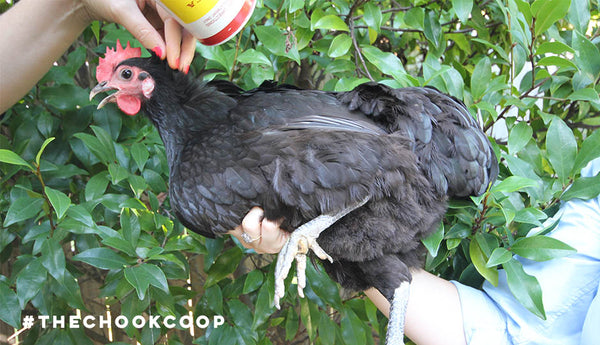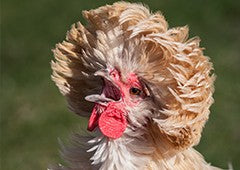As backyard chicken keepers, you strive to keep your flock happy and healthy. The best way to raise happy healthy chickens is by preventing illness in the first place. Daily observation is key to ensuring optimal health. By knowing your flock well and knowing what’s “normal” for your chickens, you will more easily recognize abnormal symptoms or behavior. Also, a little knowledge is a powerful tool in keeping a flock healthy.
Your Chicken’s Sensitive Respiratory System
Respiratory illness in chickens is quite common. Since a chicken’s respiratory system is very intricate, as well as very sensitive, they are easily susceptible to respiratory diseases. Whether or not your chickens are given the opportunity to free range during regular daylight hours, most backyard chickens do spend a great deal of time in their coop environment. This unfortunately exposes them to many pathogens in the course of their lifetime. And, despite even the most fastidious cleaning routine, the average chicken coop can be home to a myriad of troublemakers like humidity, dust, ammonia odors, extreme heat and cold, etc. Determined minute bacteria, which also possess superhuman strength, can make their way into a chicken’s sensitive respiratory system. And, once present, can multiply rapidly due to the fact that a chicken’s normal body temperature is quite high at 39 – 42 degrees C.
What is Mycoplasmosis?
Simply put, Mycoplasmosis is the poultry version of a bad cold that never seems to go away. This respiratory disease which afflicts chickens is caused by mycoplasmas-tiny bacteria-like organisms that cause respiratory problems in poultry and wild birds. The mighty Mycoplasma Gallicepticum-the most common and problematic of the mycoplasmas- is a belligerent bacteria whose only aim is to wage war on your chicken’s delicate respiratory system! Mycoplasmosis, a.k.a. MG, after the bacteria which causes it, is a slow developing infection which may or may not cause visible symptoms in your flock. However, if there are other stress inducing issues going on in your flock, symptoms may appear. Possible stressors include environmental (extreme temperatures, dust, drafts, etc.), nutritional weaknesses, other infections and the addition of new flock members, etc.
Symptoms of Mycoplasmosis
Mycoplasmosis looks like a cold and acts like a cold, but it’s so much more. Chickens who are afflicted with MG eggs-hibit the typical cold and flu-like symptoms-coughing, sneezing, runny noses, watery and/or foamy looking eyes, a rattling in their breathing, a swollen face, labored breathing, tousled feathers, loss of appetite, a drop in egg laying and sweet smelling breath.
If you live in a region where winters are cold and blustery, be aware that unfortunately, MG is more prevalent and harsh during colder times of the year.
The magnificent male ego of your regal roosters may take a bit of a blow as far as MG is concerned, because males are by far more likely to get more serious bouts of this respiratory invader than their female counterparts.
How is Mycoplasmosis Transmitted?
Mycoplasmosis, like all respiratory illnesses, is highly contagious. Infected birds spread MG to uninfected birds through secretions. Or, unsuspecting healthy birds can be infected when they come into contact with an “infected” environment-feeders and waterers, roosts, a show bird’s transport carriers, bedding and dust, a chicken keepers clothing or shoes, etc. can all harbor live bacteria for hours. Be wary also of wild birds that come and go in your backyard, for they too can carry and transmit Mycoplasmosis to your precious flock.
Mother hens can also spread MG to their chicks via the eggs. Now while we humans can transmit this bully of a bacteria to healthy chickens through contact with our infected clothing, thankfully, we cannot contract Myplasmosis ourselves.
What’s the Diagnosis?
Diagnosing Mycolplasmosis can be difficult because there are a good many other respiratory illnesses whose symptoms mimic that of MG. A simple blood test will determine if any birds in your flock are carrying antibodies to MG. Antibodies are naturally occurring proteins in the body which detect the presence of viruses and bacteria.
What to Do When the Diagnosis is Mycoplasmosis
So your beloved flock has been infected with the dreaded poultry head cold. What do you do? Immediately separate or quarantine any birds that show signs of respiratory illness and care for them in another out building, garage, basement or spare bedroom. Remove all bedding material from the chicken coop and thoroughly clean and disinfect all surfaces. Wash and disinfect all feeders and waterers, treat bowls, swings, etc. Ideally, it’s best to disinfect the chicken coop and leave it feathered friend free for a couple weeks which allows it to air out and dry well. Then, add fresh bedding, newly scrubbed feeders and waterers, chicken swing, etc. and host a clucky welcome home party!
Treatment Options
If you notice signs of respiratory illness in your chickens, isolate them as mentioned previously and care for them much as you would a sick child by letting them rest quietly and comfortably and offering them naturally healthy supplements. Add Apple Cider Vinegar or electrolytes to their drinking water. Give them a dose of probiotics. Also, mix freshly minced garlic, a natural antibiotic, into their feed. Try adding some respiratory relief in the form of freshly chopped basil, clover, dill, echinacea, and thyme to their food. Sometimes just a little TLC is all it takes to get your feathered friends feeling healthy and happy once again. Yay!
If after a few days, your chickens show no signs of recovery or are getting worse, please consult your veterinarian. Fortunately, for backyard chicken keepers, treating Mycoplasmosis is as easy as administering antibiotics. Antibiotics will definitely ease the pain of the symptoms, but unfortunately, will not rid your chickens of the infection.
Prevention is Always the BEST Medicine
So, just how do you prevent Mycoplasmosis? A strong immune system is always the best defense against respiratory illnesses. That, as well as keeping stress at a minimum and doing your utmost to keep your flock’s environment as clean as possible will help to keep MG away. Prevention is vital because MG can combine with other respiratory illnesses and ultimately bring death to your chicken coop. And, due to the fact that once a bird becomes infected with the MG bacteria, it will unfortunately be a carrier for life and whether or not said bird appears ill, it can wreak havoc in your flock by infecting its siblings.
Boosting your flock’s immune system is as easy as pie. Simply grow some Echinacea in your garden then chop up and add into your chicken’s feed. Bay leaves added to feed will also help boost your chicken’s ability to fight off respiratory illness.
Also, by covering your chicken run with a roof, chicken wire, or netting, you will prevent disease spreading wild birds from swooping in and spreading their germs to your fine feathered friends.
Mycoplasmosis-Been There, Done With That
Dealing with illness in your flock can be a bit overwhelming and stressful. We all know just how very quickly the common cold spreads among humans, especially within a family. The same is true for backyard chicken flocks. Working to keep your flock healthy and happy takes time and commitment, but is so worth the effort when you reap the rewards of keeping viruses and bacteria in their place-away from your chicken coop. So, if you hear some telltale sneezes or coughs coming from your chicken coop, take heart, feel empowered with the knowledge that you can conquer the mighty Mycoplasma Gallicepticum and try to see it as a hands-on learning egg-sperience that not only will enable you to be more prepared to prevent it in the future, but also as an opportunity to share your wisdom with fellow backyard chicken keepers. Here’s to good health!

















